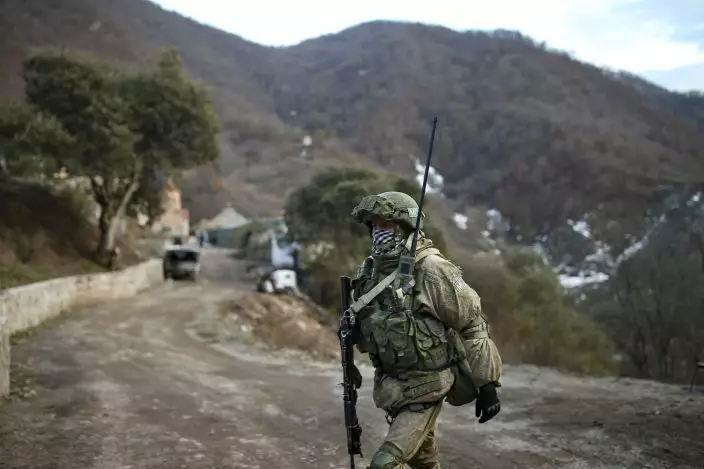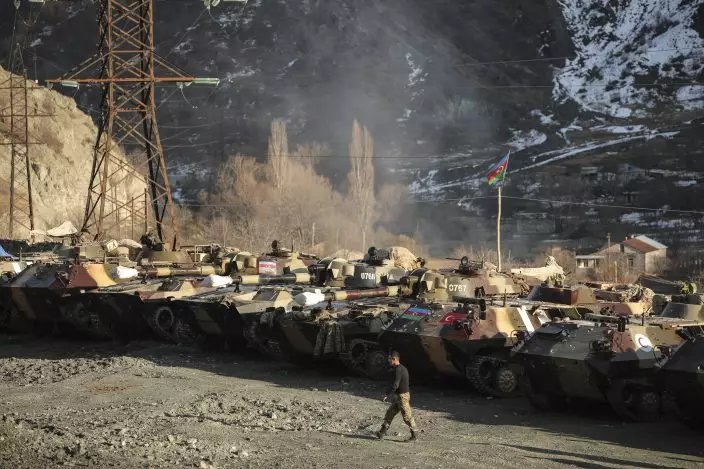Azerbaijani authorities disclosed for the first time Thursday details of the country's military casualties from recent fighting with Armenian forces over the separatist region of Nagorno-Karabakh, a 44-day conflict that a Russia-brokered truce halted last month.
Azerbaijan's Defense Ministry said 2,783 troops were killed during the intense clashes, and 103 of them are yet to be identified. More than 100 servicemen are considered to be unaccounted for, the ministry said, and 1,245 are currently undergoing treatment in medical facilities.
President Ilham Aliyev said earlier this week that 94 Azerbaijani civilians were also killed in the conflict and over 400 more have been wounded. On Thursday, he signed a decree ordering a moment of silence at 12:00 p.m. (0800 GMT) on Friday to honor the victims of the fighting.

A Russian peacekeeper guars an enter of the Dadivank, an Armenian Apostolic Church monastery dating to the 9th century, after the transfer of the Kalbajar region to Azerbaijan's control, as part of a peace deal that required Armenian forces to cede the Azerbaijani territories they held outside Nagorno-Karabakh, near Kalbajar, Azerbaijan, Wednesday, Dec. 2, 2020. A Russia-brokered peace deal that took effect Nov. 10 obliged Armenian forces to hand over all of the Azerbaijani regions they held outside Nagorno-Karabakh, including the Kalbajar region. (AP PhotoEmrah Gurel)
Nagorno-Karabakh lies within Azerbaijan but has been under the control of ethnic Armenian forces backed by Armenia since a separatist war there ended in 1994. That war left Nagorno-Karabakh itself and substantial surrounding territory in Armenian hands.
The heavy fighting that erupted in late September marked the biggest escalation of a long-simmering conflict between the two ex-Soviet nations. Thousands of people on both sides died. Armenia’s Health Minister said last month that at least 2,425 Armenian servicemen were killed in action, and many of them were yet to be identified.
A Russian-brokered peace deal took effect on Nov. 10, ending the conflict. The agreement stipulated that Armenia hand over control to Azerbaijan of several regions it holds outside Nagorno-Karabakh’s borders. Azerbaijan also retained control over areas of Nagorno-Karabakh it has taken during the conflict.

Azerbaijani military vehicles are parked after the transfer of the Kalbajar region to Azerbaijan's control, as part of a peace deal that required Armenian forces to cede the Azerbaijani territories they held outside Nagorno-Karabakh, in Kalbajar, Azerbaijan, Wednesday, Dec. 2, 2020. A Russia-brokered peace deal that took effect Nov. 10 obliged Armenian forces to hand over all of the Azerbaijani regions they held outside Nagorno-Karabakh, including the Kalbajar region. (AP PhotoEmrah Gurel)
The deal was celebrated in Baku as a major victory. Aliyev on Wednesday declared a new national holiday, dubbed Victory Day, to mark the day when the truce entered force.
On Thursday, Aliyev's office announced moving the holiday to Nov. 8, when the strategically important city in Nagorno-Karabakh, Shusha, was taken by Azerbaijani forces. Aliyev made the decision as Nov. 10 is Ataturk Memorial Day in Turkey, Azerbaijan’s major ally, a statement by the Azerbaijani presidential administration read.
In Armenia, the peace deal sparked outrage. Mass protests erupted in the capital Yerevan, with thousands regularly taking to the streets to demand the ouster of the country’s prime minister.


